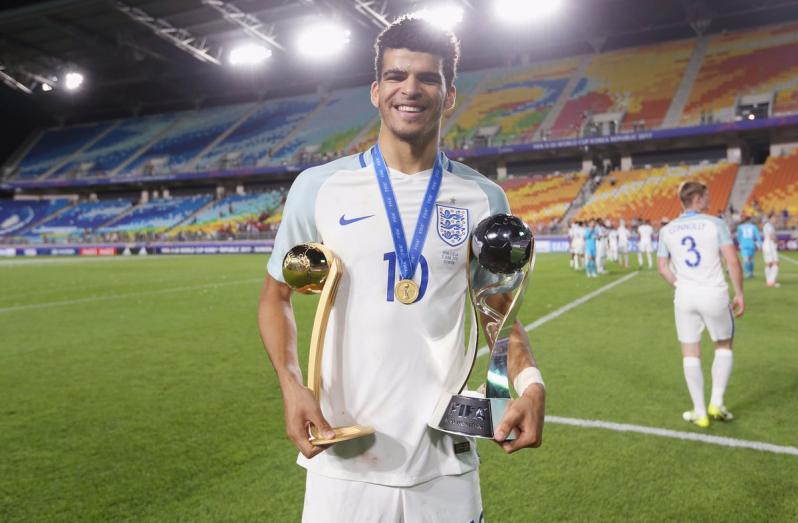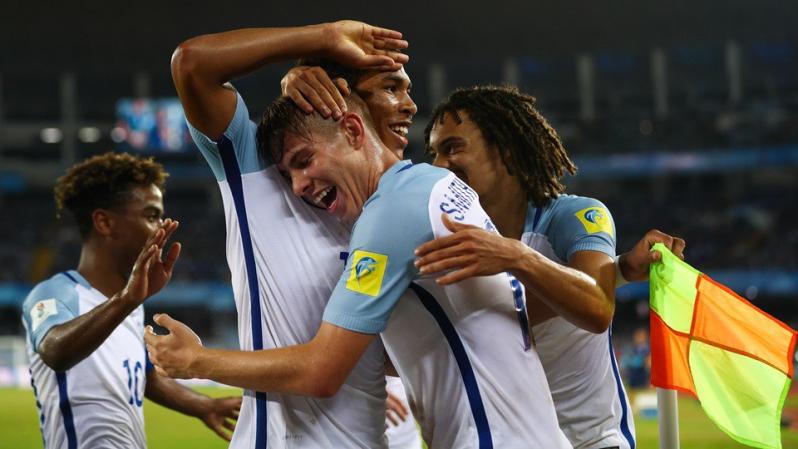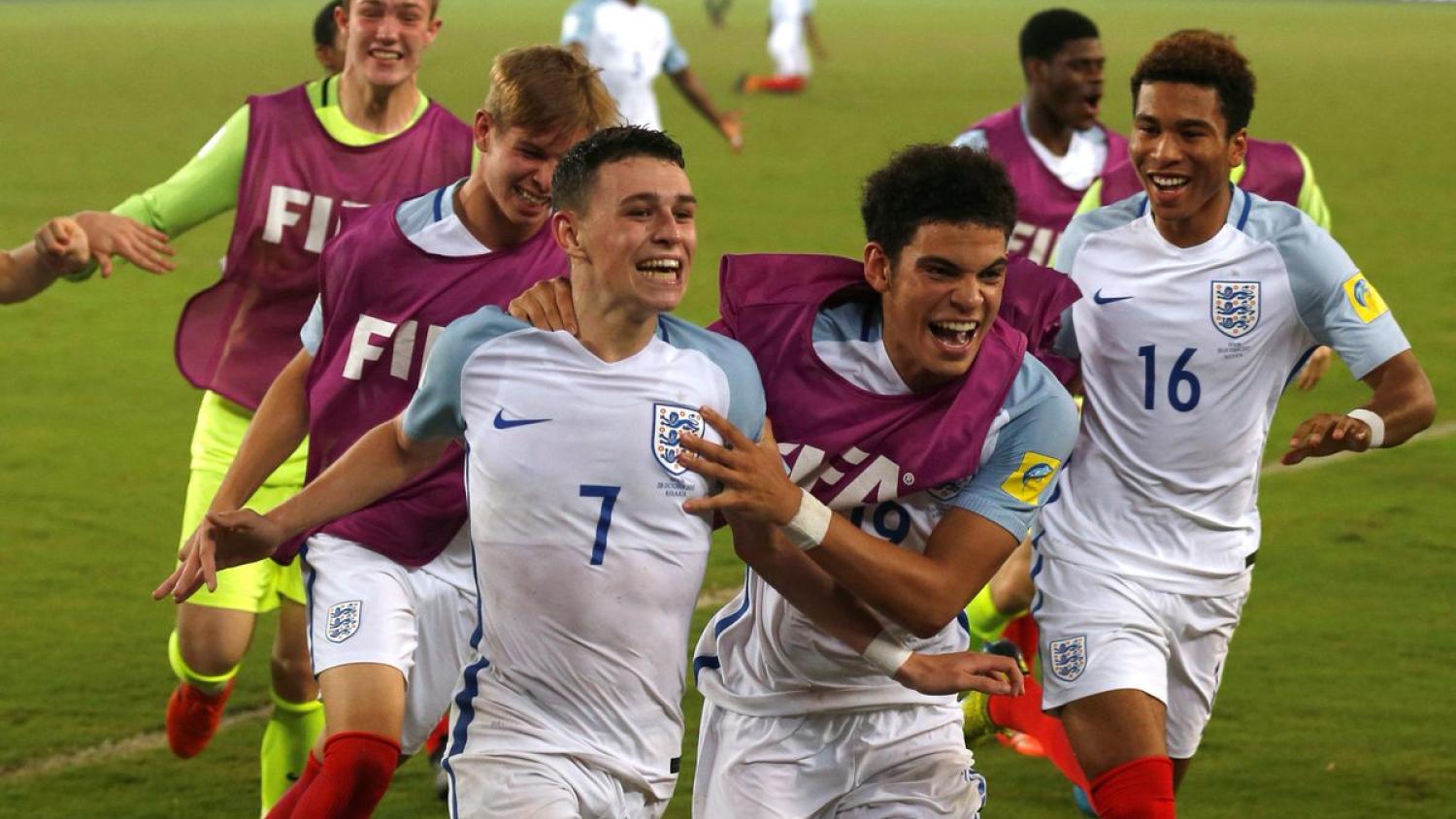England completed a rare double on Saturday, rallying to defeat Spain 5-2 and claim the U-17 World Cup after winning the U-20 World Cup earlier this year. The Three Lions also finished second in the U-17 Euros and reached the semifinals of the U-21 Euros. Is England on the verge of a new golden age of football?
England hasn’t been a major player at the Euros let alone the World Cup since the 1990s, when they reached the semifinals of the 1996 Euros (which they hosted) and finished fourth at the 1990 World Cup in Italy. But the so-called Golden Generation of English players in the 2000s couldn't lived up to its moniker, never succeeding for country like they did winning Premier League and Champions League titles with their clubs.
But with all this success currently at the youth levels, can we expect England to actually excel against the world’s elite?
You can’t deny England’s youth teams are among the best in the world. On Saturday, the Three Lions fell behind 2-0 after a pair of goals from Sergio Gomez in the first half hour of play. But England roared back with five unanswered goals, including two from Manchester City’s Philip Foden. Morgan Gibbs White scored the equalizer in the 58th minute and the second half was all England in front of 66,684 spectators at the Vivekananda Yuba Bharati Krirangan Stadium in Kolkata, India.
Rhian Brewster, who had hat tricks in each of his two prior matches, scored a crucial goal Saturday, heading home from close range in the 44th minute to give England some life heading into the break. The Liverpool youth player finished as the Golden Boot winner with eight goals.
With the exception of a nervy 0-0 draw against Japan in the Round of 16, England dominated the U-17 World Cup, winning six matches by a combined 17 goals. Stunningly, England actually won a shootout, 5-3 against Japan before going on to crush the U.S. 4-1 and Brazil 3-1. Foden was named the Golden Ball winner (Brewster was third in the voting).
In the U-20 World Cup, England again won six matches with one draw, albeit in slightly less dominating fashion with a plus-nine goal differential. Liverpool youngster Dominic Solanke (four goals) won the Golden Ball and Newcastle keeper Freddie Woodman won the Golden Glove. Everton’s Dominic Calvert-Lewin scored the only goal in a 1-0 win over Venezuela in the final. The Three Lions also beat Argentina, South Korea, Costa Rica, Mexico and Italy along the way.

Dominic Solanke. Photo: @FIFAcom | Twitter
These kids can play. Many of them are starting to get playing time with big Premier League clubs. But despite the success at these youth tournaments, it’s hard to say definitively that England is primed for greatness.
Only one other country has won the U-17 and U-20 World Cup titles in the same year — the same country that leads the world in most World Cup victories. Brazil won both tournaments in 2003, beating Spain in both finals. While Brazil followed up that success with victories in the next two Copa Americas, the Seleção haven’t won a World Cup since 2002, one of the country’s longest droughts.
Success at youth tournaments has never been a good indicator of future success at the full national team level. Aside from Brazil, which is almost always an exception in soccer, no team has won the World Cup that followed a U-17 or U-20 World Cup victory (Brazil did it after a 1993 U-20 win in 1994 and after a 1999 U-17 win in 2002).
Even if you gave those youth players more time to make their way into the full national team, aside from Brazil, three countries have won a World Cup after a youth World Cup title, but few players were involved in both championships. Spain won the U-20 tournament in 1999 with Xavi in the side before winning it all in 2010. West Germany won what was then the FIFA World Youth Championship in 1981 before winning the 1990 World Cup. Argentina won the 1979 World Youth title and the 1986 World Cup, both with Diego Maradona.
There is little correlation in winning youth tournaments and winning World Cups, but that’s not to say it’s bad to do well. While there are often non-traditional powers that reach the finals (or even win) youth tournaments, for the most part the teams that are traditionally successful at least perform decently and — importantly — qualify for these youth tournaments.

U-17 World Cup. Photo: @ElAmistyNobo | Twitter
Getting experience in a major international competition is vital. Just look at the United States, which has missed out on each of the last two Olympics and thus have struggled to revitalize their national team with players between the ages of 20 and 25. That may have played a role in the U.S. failing to qualify for the 2018 World Cup.
On the flip side, England keeps racking up youth tournament successes and at the same time cruised through qualifying for next year’s World Cup. The Three Lions aren’t guaranteed to have success at the next World Cup (or the next few), but they’re set up to do well. The experience players like Foden, Solanke, Brewster and others have gained will aid them as they fight for places in the full England squad.
In the 2000s, the likes of David Beckham, Sol Campbell, Michael Carrick, Rio Ferdinand, Steven Gerrard, Frank Lampard, Michael Owen, Wayne Rooney, Paul Scholes and John Terry were among the best club players in the world at their positions. None of them were able to accomplish anything (on a team level) with the national team. England hasn’t made it past the quarterfinals at a major tournament since 1996.
The Three Lions have moved well past that failed generation and boast a fairly young squad that comfortably qualified over Slovakia, Scotland and Slovenia. Only four players have been called up in 2017 age 30 or older. There’s even more youth to back the team up, as evidenced by the team’s success at recent World Cups.
However, there is one worrying trend for England fans. Every single member of the team plays in England. No one is out getting experience with Real Madrid or Barcelona, no one has been able to get into a team like Bayern Munich, Juventus or PSG. Harry Kane may end up in La Liga one day, but the vast majority of England players will remain in the Premier League.
England’s lost Golden Generation also consisted of players who almost exclusively played domestically. Other recent golden generations like Spain and Germany all had a number of players competing abroad. The Three Lions could improve their chances at the next two World Cups if some of their players began proving themselves at top clubs in other leagues, much like Cesc Fabregas, Sami Khedira, Mesut Ozil, Juan Mata and many more did for the last two World Cup champions. The Premier League is not definitively the best league in the world.
Winning two youth World Cups is an impressive achievement for England, etching their names alongside the greatest footballing nation in the world, Brazil. But the work for England is far from over. Many things must fall in place for the Three Lions before they can consider themselves back at the top of the game they invented more than a century ago.
England is making good progress, but this isn’t the 1800s — everyone else is getting better too. This resurgence could be the start of something great for England, but it just as likely could be another false dawn.





